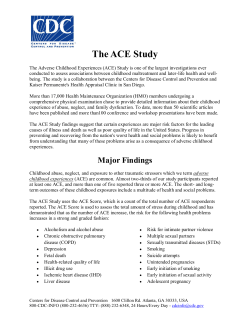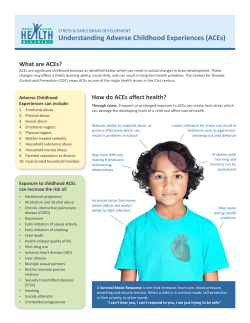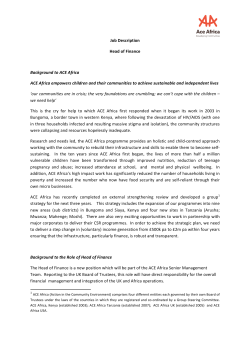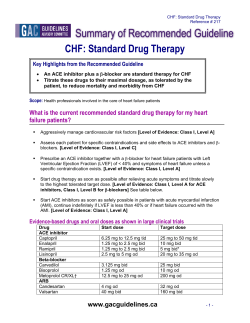
Adverse Childhood Experiences and Health Across the Lifespan Robert Anda, MD, MS
Adverse Childhood Experiences and Health Across the Lifespan Robert Anda, MD, MS www.RobertAndaMD.com www.ACEstudy.org www.cdc.gov/ACE “In the brain, as in the economy, getting it right the first time is ultimately more effective and less costly than trying to fix it later. “ James Heckman Nobel Laureate Economist National Scientific Council on the Developing Child, Perspectives: The Cradle of Prosperity. (2006). http://www.developingchild.net The Walk to Paradise Garden W. Eugene Smith Stress (adrenaline, cortisol) Unpredictable Severe Predictable Moderate Number of Episodes Chronicity* Vulnerability (Poly)genetics Epigenetics Intrauterine exposures* Resilience The Adverse Childhood Experiences (ACE) Study Examines the health and social effects of ACEs throughout the lifespan among 17,421 members of the Kaiser Health Plan in San Diego County A Primary Care Setting… Educated… Middle Class.. Predominantly White… Adverse Childhood Experiences Are Common Household dysfunction: Substance abuse Parental sep/divorce Mental illness Battered mother Criminal behavior 27% 23% 17% 13% 6% Abuse: Psychological Physical Sexual 11% 28% 21% Neglect: Emotional Physical 15% 10% Adverse Childhood Experiences Rarely Occur in Isolation… They come in groups. Prevalence of Childhood Abuse by Frequency of Witnessing Domestic Violence 100 Frequency of witnessing domestic violence Never Once,Twice Sometimes Often Very often Percent (%) 80 60 40 20 0 Emotional Physical Childhood Abuse Sexual ACEs tend to come in groups… Additional ACEs (%) 1 2 3 4 >5 If you had: A battered mother 95 82 64 48 52 Adverse Childhood Experiences Score Biologic Stress “Dose” ACE Score 0 1 2 3 4 or more Prevalence 33% 26% 16% 10% 16% ACEs, Smoking, and Lung Disease ACE Score and HIV Risks Ever Injected Drugs Had 50 or More Intercourse Partners Ever Had an STD Percent with alcohol related problem The ACE Score… Alcohol Use and Abuse Alcoholic Married an Alcoholic Leading Causes of Death… Percent (%) The ACE Score and the Prevalence of Coronary Heart Disease ACE Score A Focus on Mental Health… Percent depressed (%) The ACE Score and a Lifetime History of Depression ACE Score Percent atempted (%) The ACE Score and the Prevalence of Attempted Suicide ACE Score Cumulative ACEs Increase the Number of Lifetime DSM-IV Diagnoses* National Comorbidity Survey – Replication Sample 9 N=5692 Number of Lifetime DSM-IV Diagnoses 8 7 6 5 4 3 2 1 0 *Putnam, Harris, Putnam unpublished data, 2011 CCAP0 CCAP1 CCAP2 Increasing ACEs CCAP3 CCAP4 Art of: Hieronymous Bosch The Creation of Adam Michelangelo 1508-1512 ACEs and Reproductive Health Percent who had a teen pregnancy Adverse Childhood Experiences and Adolescent Pregnancy 0 1 2 3 4 ACE Score 5 6 7-8 Percent Percent of Women Who Ever Had an Unintended Pregnancy by ACE Score ACE Score Percent who had a fetal death after 1st or 2nd pregnancy Adverse Childhood Experiences and Fetal Death First or Second Pregnancy 0 1-2 ACE Score 3-4 5+ The Costs of the Status Quo.. Reflect the Costs of Ignoring and Impairing Early Childhood Development ACEs and High School Sophomores and Seniors Population Average Spokane Washington Students with 3 or more ACEs: ·Are 2 ½ times more likely to fail a grade ·Score lower on standardized tests ·Have language difficulties ·Are suspended or expelled more ·Are designated to special education more frequently -Have poorer health Courtesy of Chris Blodgett, PhD Washington State University ACEs Among Youth on Probation Pierce County, Washington ACE Exposure and Youth Outcomes ACE Score and Repeated Suspension/Expulsion Youth on Probation, Pierce County, WA ACE Score and Poor Academic Performance Youth on Probation, Pierce County, WA ACE Score and Felony Re-offense ACE Score The paradigm is shifting… An the word is getting around Adverse Childhood Experiences As a National Health Issue ACEs have a strong influence on: -adolescent health -reproductive health -smoking -obesity -alcohol abuse -illicit drug abuse -sexual behavior - mental health - risk of violence and revictimization - stability of relationships - performance in the workforce Adverse Childhood Experiences As a National Health Issue ACEs increase the risk of: -Early death - Heart disease - Chronic Lung disease - Lung cancer - Liver disease -Autoimmune disease - Suicide - Injuries - HIV and STDs - other risks for leading causes of death Beham, (Hans) Sebald (1500-1550): Hercules slaying the Hydra, 1545 from The Labours of Hercules (1542-1548). A Public Health Framework For Change Treatment Education Prevention All must consider Intergenerational transmission The Walk to Paradise Garden W. Eugene Smith “Turning our backs on the developmental effects of toxic stress is unacceptable.. it is time to lay the path.” Laura Porter Casey Family Programs Family Policy Council Washington State Mentors “Think Tank” 11/3/2010 Programs targeting the earliest years Rates of return to human capital investment Preschool programs K-12 interventions Job training 0-3 4-5 6-18 Age 19+ Heckman, J. (2007) States With ACE Studies in 2008 No data Source: Behavioral Risk Factor Surveillance System, CDC. States With ACE Studies in 2009 6 States No data 2009 Source: Behavioral Risk Factor Surveillance System, CDC. States With ACE Studies in 2009-2010 13 States No data 2009 2010 Source: Behavioral Risk Factor Surveillance System, CDC. States With ACE Studies in 2009-2011 18 States No data 2009 2010 2011 Source: Behavioral Risk Factor Surveillance System, CDC. “In the brain, as in the economy, getting it right the first time is ultimately more effective and less costly than trying to fix it later. “ James Heckman Nobel Laureate Economist National Scientific Council on the Developing Child, Perspectives: The Cradle of Prosperity. (2006). http://www.developingchild.net Art of Hieronymous Bosch The Costs of the Status Quo.. Reflect the Costs of Ignoring and Impairing Early Childhood Development
© Copyright 2025





















